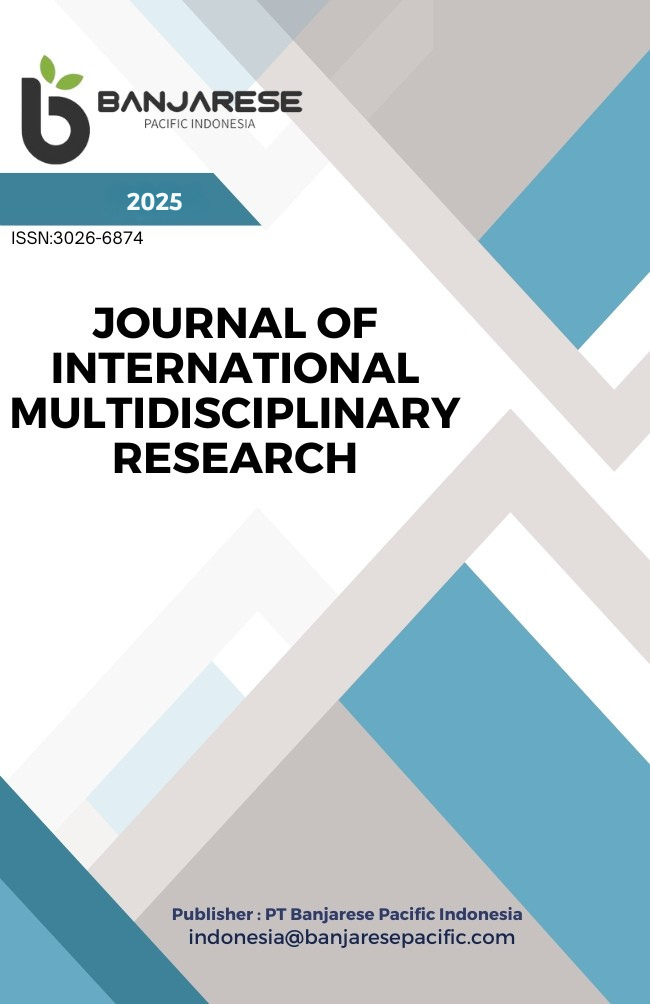Pengaruh Faktor Sosial Ekonomi Terhadap Adopsi Sistem Agroforestri Di Provinsi Gorontalo
DOI:
https://doi.org/10.62504/jimr1259Keywords:
Agroforestri, adopsi teknologi, faktor sosial-ekonomiAbstract
Penelitian ini bertujuan menganalisis pengaruh faktor sosial-ekonomi terhadap adopsi sistem agroforestri di Provinsi Gorontalo. Agroforestri dipandang sebagai solusi berkelanjutan untuk mengatasi masalah lingkungan seperti banjir dan longsor melalui integrasi komponen pertanian, kehutanan, dan peternakan. Metode penelitian menggunakan pendekatan kuantitatif dengan regresi logistik, melibatkan 164 responden dari enam desa yang dipilih secara proporsional. Data dikumpulkan melalui survei, wawancara, observasi, dan dokumentasi, lalu dianalisis dengan statistik deskriptif, uji Chi-Square, dan regresi logistik biner. Hasil menunjukkan bahwa luas lahan (X5), penyuluhan (X8), dan keanggotaan kelompok tani hutan (KTH) (X7) menjadi faktor dominan yang memengaruhi adopsi. Petani dengan lahan ≥2 Ha memiliki peluang 201% lebih tinggi untuk mengadopsi agroforestri, sementara penyuluhan dan keanggotaan KTH meningkatkan peluang sebesar 2,75 kali dan 2,5 kali. Sebaliknya, usia (X1) dan pendidikan (X3) tidak berpengaruh signifikan, meskipun tren menunjukkan petani muda lebih terbuka pada inovasi. Analisis threshold (ambang batas skor 50 vs 60) mengungkap variasi adopsi antardesa, dengan Desa Tangga Barito memiliki tingkat adopsi tertinggi (87,5%) dan Bondawuna terendah (10,34%). Temuan ini selaras dengan literatur global yang menekankan pentingnya kapasitas teknis, jejaring sosial, dan kebijakan kontekstual. Rekomendasi strategis mencakup penyuluhan spesifik lokasi, model agroforestri yang ramah lahan sempit dan curam, serta insentif finansial bagi petani kecil. Penelitian juga menyarankan pendekatan berbasis data untuk merancang kebijakan adaptif, seperti penguatan kelompok tani dan konsolidasi lahan. Kontribusi teoretis melibatkan kerangka analisis threshold untuk memahami dinamika adopsi secara kontekstual, sedangkan implikasi praktis berfokus pada integrasi agroforestri dalam program pengentasan kemiskinan dan adaptasi iklim. Penelitian ini diharapkan menjadi referensi dalam pengembangan kebijakan pertanian berkelanjutan di Indonesia, terutama di wilayah dengan tantangan biofisik dan struktural seperti Gorontalo. Dengan pendekatan partisipatif yang melibatkan pemerintah daerah, NGO, dan kelompok petani, agroforestri dapat menjadi pilar utama dalam pengelolaan sumber daya alam yang harmonis antara ekologi, ekonomi, dan sosial.
Downloads
References
Abdul-Salam, Y., Ovando, P., & Roberts, D. (2022). Understanding the economic barriers to the adoption of agroforestry: A Real Options analysis. Journal of Environmental Management, 302, 113955. https://doi.org/10.1016/j.jenvman.2021.113955
Amare, D., & Darr, D. (2024). Holistic analysis of factors influencing the adoption of agroforestry to foster forest sector based climate solutions. Forest Policy and Economics, 164, 103233. https://doi.org/10.1016/j.forpol.2024.103233
Amare, D., & Darr, D. (2023). Can a sequential analysis provide a more robust understanding of farmers’ adoption decisions? An example from an agroforestry adoption study in Ethiopia. Forest Policy and Economics, 153, 102997. https://doi.org/10.1016/j.forpol.2023.102997
Arikunto, Suharsimi. 2019. Prosedur Penelitian Suatu Pendekatan Praktik. Jakarta: Rineka Cipta.
Bulan, R., & Hiola, A. S. (2018). FAKTOR KUNCI PENGEMBANGAN BIOETANOL AREN DI KABUPATEN BOALEMO PROVINSI GORONTALO. Gorontalo Journal of Forestry Research, 1(1), 44–58. https://doi.org/https://doi.org/10.32662/gjfr.v1i1.76
Deißler, L., Mausch, K., Grote, U., Karanja, A., & McMullin, S. (2024). Aspirations, ambitions and the adoption of diverse fruit trees – a case study of the livelihood effects in Kenya. Trees, Forests and People, 16, 100544. https://doi.org/10.1016/j.tfp.2024.100544
Etongo, D., Bristol, U., Epule, T. E., Bandara, A., & Sinon, S. (2023). Expert elicitations of smallholder agroforestry practices in Seychelles: A SWOT-AHP analysis. Regional Sustainability, 4(3), 282–295. https://doi.org/10.1016/j.regsus.2023.08.006
Hasanuzzaman, M., Adhikary, P. P., & Shit, P. K. (2025). Implement agroforestry practices to reduce soil erosion and promote multiple beneficial ecosystem services in the gully-degraded lands of Northwest West Bengal, India. Ecological Frontiers. Advance online publication. https://doi.org/10.1016/j.ecofro.2024.12.009
Hiola, A. S., Sandalayuk, D., & Ruruh, A. (2025). Analisis Keanekaragaman Hayati: Peluang Agroforestri dalam Mengatasi Perubahan Iklim di Dulamayo, Gorontalo, Indonesia. Journal of International Multidisciplinary Research, 2(12), 276–284. https://doi.org/10.62504/JIMR1198
Irwin, R., Short, I., & Ní Dhubháin, Á. (2025). Understanding the barriers and enablers to agroforestry adoption in Ireland through an innovation systems approach. Journal of Rural Studies, 117. https://doi.org/10.1016/j.jrurstud.2025.103641.
Jaza Folefack, A. J., & Darr, D. (2021). Promoting cocoa agroforestry under conditions of separated ownership of land and trees: Strengthening customary tenure institutions in Cameroon. Land Use Policy, 108. https://doi.org/10.1016/j.landusepol.2021.105524.
Leduc, G., & Hansson, H. (2024). Behavioural factors for farmers’ adoption of agroforestry practices in Sweden. Sustainable Production and Consumption, 47, 178–189. https://doi.org/10.1016/j.spc.2024.03.023.
Mariel, P., Wainaina, P., Duguma, L., Majale, C., Mucheru-Muna, M., Mutune, J., Foundjem-Tita, D., Bah, A., & Minang, P. (2024). Factors influencing agroforestry practices adoption in the central river region of The Gambia. Nature-Based Solutions, 6, 100168. https://doi.org/10.1016/j.nbsj.2024.100168
Muthee, K., Wainaina, P., Duguma, L., Majale, C., Mucheru-Muna, M., Mutune, J., Foundjem-Tita, D., Bah, A., & Minang, P. (2024). Factors influencing agroforestry practices adoption in the central river region of The Gambia. Nature-Based Solutions, 6, 100168. https://doi.org/10.1016/j.nbsj.2024.100168
Prabawani, B., Hadi, S. P., Fisher, M. R., Warsono, H., Dewi, R. S., & Ainuddin, I. (2024). Socioeconomic perspective of agroforestry development in Central Java. Environmental and Sustainability Indicators, 22. https://doi.org/10.1016/j.indic.2024.100354
Telwala, Y. (2023). Unlocking the potential of agroforestry as a nature-based solution for localizing sustainable development goals: A case study from a drought-prone region in rural India. Nature-Based Solutions, 3, 100045. https://doi.org/10.1016/j.nbsj.2022.100045
Tebkew, M., Asfaw, Z., & Worku, A. (2024). The role of agroforestry systems for addressing climate change livelihood vulnerability of farmers of Northwestern Ethiopia. Heliyon, 10(17), e36196. https://doi.org/10.1016/j.heliyon.2024.e36196
Swami, D., & Parthasarathy, D. (2024). Role of intrinsic motivation and government policies in adoption of sustainable agriculture practices by farmers in Maharashtra, India. Farming System, 2(3), 100100. https://doi.org/https://doi.org/10.1016/j.farsys.2024.100100
Zabala, A., Pascual, U., García-Barrios, L. E., & Mukherjee, N. (2025). Drivers to adopt agroforestry and sustainable land-use innovations: A review and framework for policy. Land Use Policy, 151, 107468. https://doi.org/10.1016/j.landusepol.2025.107468
Downloads
Published
Issue
Section
License
Copyright (c) 2025 Verra Adam, Sofyan Abdullah , Iswan Dunggio (Author)

This work is licensed under a Creative Commons Attribution-ShareAlike 4.0 International License.













